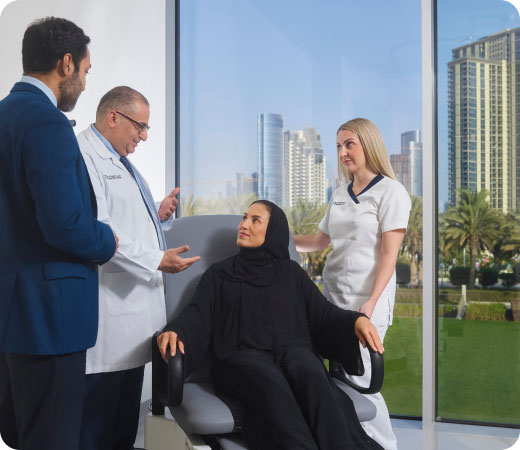.jpg?h=539&w=1920&la=en&hash=70F9A9CF55F96B67D55A2256AC1DEB9B)
There is increasing evidence from scientific research that up to 10% of all cancers might be caused by inherited gene mutations, a disease-causing gene. There is another proportion of patients with cancers running in their family. The remaining cancers are believed to be sporadic and more research is underway to understand the causes behind them. For patients who have either a cancer-causing gene or a family history of certain cancers, they can take action to mitigate the risk.
The Hereditary High-Risk Program at Cleveland Clinic Abu Dhabi provides support and counselling to patients who have an identified inherited gene mutation, have a family or personal history of cancer, , all of which may increase their risk of developing the disease. The program’s team of genetic experts then work with patients to develop personalized, precision management plans, including medical and surgical treatment options.
The Hereditary High-Risk Program at Cleveland Clinic Abu Dhabi is innovative within the field of precision medicine. As an embedded service within our Cancer Institute, providing novel models of care, we offer an integrated, compassionate and holistic approach to serve our patients.
.jpg?h=1100&w=1260&la=en&hash=CC4B7E8AF3C196C1A5425444378D609C)
Our Hereditary High-Risk Program combines the very latest research in hereditary cancers with an expert, multidisciplinary team of specialists to provide compassionate individualized care.
Our aim is to identify people who may be at an increased risk of developing cancer. We then work closely with these individuals to provide the appropriate support that they need. We educate and counsel people on their individual risk and risk reduction methods, and we discuss the most effective screening and prevention methods available to them.
Our team are also actively involved in research studies into hereditary cancers, and with the support of research participants, are working towards a better understanding of the role of genetic mutations in cancer, and ultimately how we can better manage the risk that they present.

Many of us will have a relative who has been diagnosed with cancer. This does not necessarily mean that you are at an increased risk of cancer. However, when there is a significant family history, more than one type of cancer has previously been diagnosed, or there has been an early onset of cancer, there could be a high risk of cancer developing. People who fall into any of the following categories should book an appointment with our team:

Ahead of an appointment with the Hereditary High-Risk Program team, it is important that you gather as much family history as possible. The team will need to know about who in the family has been diagnosed with cancer, their age at diagnosis, any recurrence of cancer, and the type(s) of cancer they have had. The team will also need to know about any previous genetic testing that family members may have had.
At your appointment, you will meet with a high-risk physician who will perform a risk estimation based your personal and family history of cancer, as well as your genomic information. If identified to be at increased risk, patients will then be offered a personalized preventative program which may include genetic testing, lifestyle modification, enhanced screening, preventive medication, and surgery to reduce the risk of cancer.
Genetic counselling involves the following steps:
Our program provides comprehensive and compassionate services, education and support to at risk individuals and their family members. Our experts team consists of:

Speak with our Contact Center for assistance
Request an Appointment 800 8 2223 International Patients